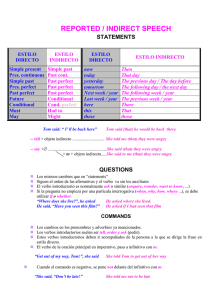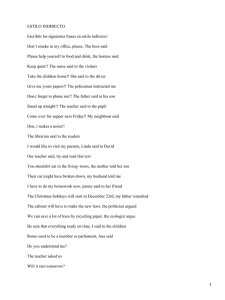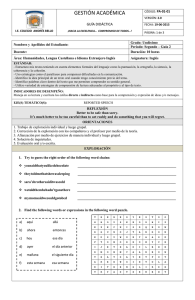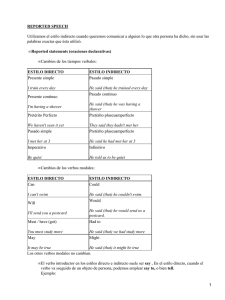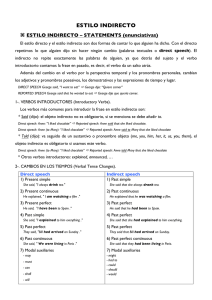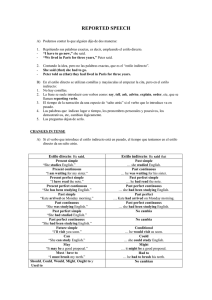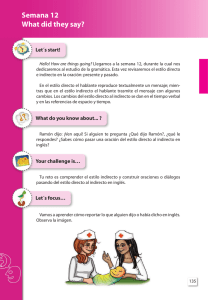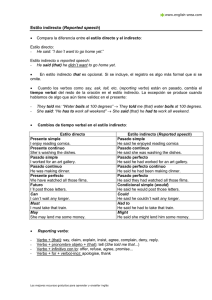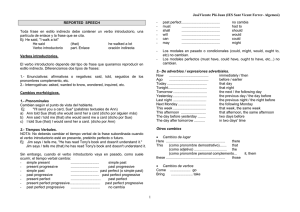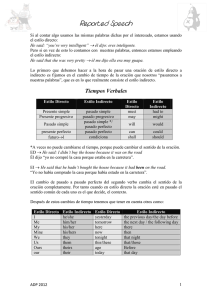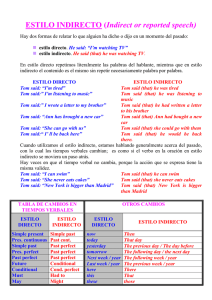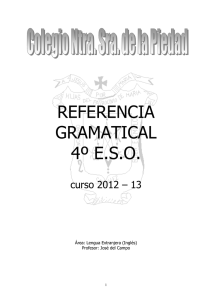Estilo Indirecto - englishforbachillerato2
Anuncio
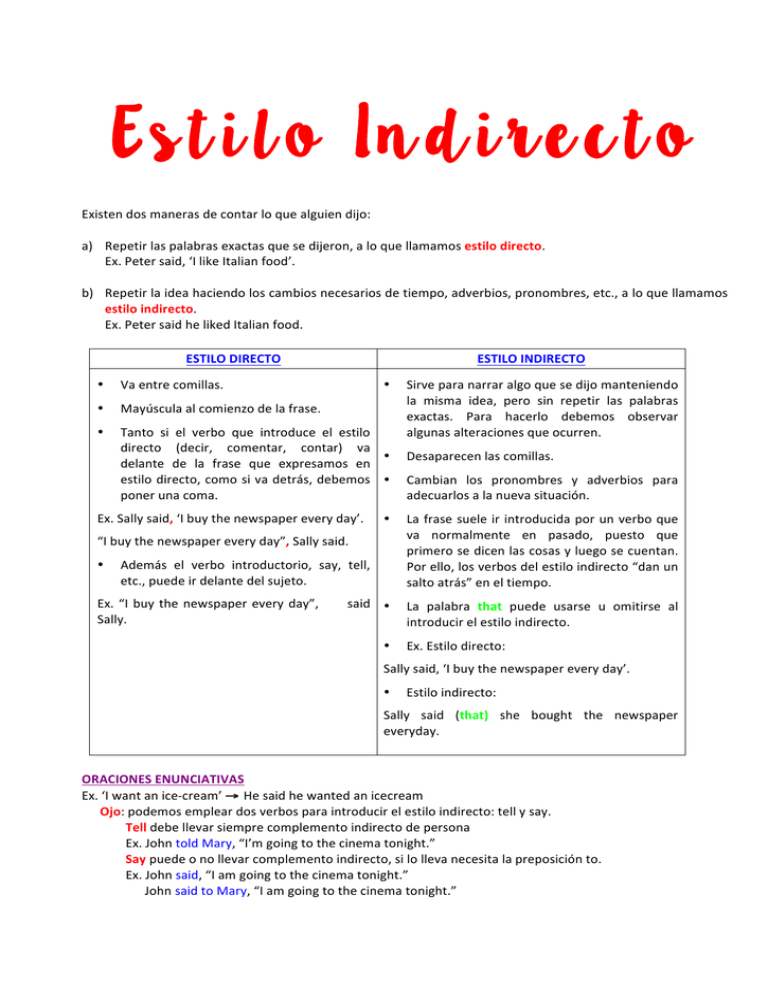
Estilo Indirecto Existendosmanerasdecontarloquealguiendijo: a) Repetirlaspalabrasexactasquesedijeron,aloquellamamosestilodirecto. Ex.Petersaid,‘IlikeItalianfood’. b) Repetirlaideahaciendoloscambiosnecesariosdetiempo,adverbios,pronombres,etc.,aloquellamamos estiloindirecto. Ex.PetersaidhelikedItalianfood. ESTILODIRECTO ESTILOINDIRECTO • Vaentrecomillas. • Mayúsculaalcomienzodelafrase. • Tanto si el verbo que introduce el estilo directo (decir, comentar, contar) va • delante de la frase que expresamos en estilodirecto,comosivadetrás,debemos • ponerunacoma. Ex.Sallysaid,‘Ibuythenewspapereveryday’. • Sirveparanarraralgoquesedijomanteniendo la misma idea, pero sin repetir las palabras exactas. Para hacerlo debemos observar algunasalteracionesqueocurren. Desaparecenlascomillas. Cambian los pronombres y adverbios para adecuarlosalanuevasituación. • Lafrasesueleirintroducidaporunverboque va normalmente en pasado, puesto que primerosedicenlascosasyluegosecuentan. Porello,losverbosdelestiloindirecto“danun saltoatrás”eneltiempo. Ex. “I buy the newspaper every day”, said • Sally. • La palabra that puede usarse u omitirse al introducirelestiloindirecto. “Ibuythenewspapereveryday”,Sallysaid. • Además el verbo introductorio, say, tell, etc.,puedeirdelantedelsujeto. Ex.Estilodirecto: Sallysaid,‘Ibuythenewspapereveryday’. • Estiloindirecto: Sally said (that) she bought the newspaper everyday. ORACIONESENUNCIATIVAS Ex.‘Iwantanice-cream’→ → Hesaidhewantedanicecream Ojo:podemosempleardosverbosparaintroducirelestiloindirecto:tellysay. Telldebellevarsiemprecomplementoindirectodepersona Ex.JohntoldMary,“I’mgoingtothecinematonight.” Saypuedeonollevarcomplementoindirecto,silollevanecesitalapreposiciónto. Ex.Johnsaid,“Iamgoingtothecinematonight.” JohnsaidtoMary,“Iamgoingtothecinematonight.” Cuando el verbo introductorio está en pasado cambian las personas, los tiempos verbales, los pronombres y algunasexpresionestemporales: E.DIRECTO E.INDIRECTO Presentesimple play(s) Pasadosimple played Presentecontinuo is/areplaying Pasadocontinuo was/wereplaying Pasadosimple played Pretéritopluscuamperfecto hadplayed Presenteperfecto played Pretéritopluscuamperfecto hadplayed Pasadoperfecto hadplayed Pretéritopluscuamperfecto hadplayed Futuro willplay condicional wouldplay Can could May might Must hadto Shall should Ojo:estoscambiosnoocurrensielverboqueintroduceelestilodirectovaenpresenteofuturo. E.DIRECTOE.INDIRECTO These.........................................those Now...........................................then Tomorrow.................................thefollowingday/thedayafter Yesterday..................................thepreviousday/thedaybefore Ayearago.................................theyearbefore Me.............................................him/her Mine..........................................his/hers Us..............................................them Ours..........................................theirs This............................................that Here..........................................there Today........................................thatday Nextweek.................................thefollowingweek/theweekafter Lastnight..................................thepreviousnight/thenightbefore I.................................................he/she My.............................................his/her We.............................................they Our............................................their This/these................................that/those Verbosmáscomunes:tell(someone),say(TOsomeone) Otrosverbos:admit,agree,announce,answer,apologise,boast,claim,complain,declare,deny,explain, inform,insist,mention,offer,promise,refuse,remind,reply,state ORACIÓNINTERROGATIVA Ex.‘Wheredoyoulive?’→ → Sheaskedwhereshelived ‘Doyoulikeshopping?’→Sheaskedif/whetherhelikedshopping Laoracióninterrogativaseconvierteenenunciativa,desaparecelainterrogación,laformainterrogativay losdospuntos.Tambiénseproducenlosmismoscambiosqueenlaenunciativa. Verbos:ask,enquire,request,wanttoknow,wonder ORACIÓNDEMANDATO ‘Sitdown’→Sheaskedmetositdown ‘Don’tshout’→Hetoldusnottoshout Algunosverbosusadosenelestiloindirectoson:advise,encourage,invite,persuade,remind,warn…Recuerda queestosverbosvanseguidosdeunpronombreobjetoodeunnombre. Verbos: tell, demand, order (mandato), ask, beg (peticiones), invite (invitaciones), shout, warn (advertencias) SUGERENCIAS Paraescribirestasoracionesenelestiloindirectopodemosutilizardosfórmulas: • Hacerloutilizandolaformabaseousandoshould.Enestecasolasugerenciaesparaotrapersona(-s): Ex.‘Shallwegoforawalk?’→Hesuggested(that)they(should)goforawalk. • Escribirelverbosuggest,recommend,proposeseguidodelverbodelaoraciónprincipalengerundio. Enestecasolapersonaquehablaseincluyeenlasugerencia. Ex.‘Whydon’twegoouttonight?’→Shesuggestedgoingoutthatnight. Otrosverbos:insist,demand,advise,invite *RECUERDAquealgunosverbosvanseguidosdeinfinitive(promise,agree,refuse,advise,remind…)yotros degerundio(deny,admit,suggest…)REPASAELTEMADELOSGERUNDIOS/INFINITIVOS
